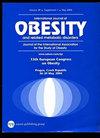Epigenetic programming of obesity in early life through modulation of the kynurenine pathway
IF 4.2
2区 医学
Q1 ENDOCRINOLOGY & METABOLISM
引用次数: 0
Abstract
Childhood obesity is a global health concern that has its origins before birth. Although genetics plays a crucial role, increasing evidence suggests that epigenetic modifications during fetal life could also influence its incidence. In this model, during the fetal period, interactions between genetic makeup, intrauterine factors, and environmental conditions, increase the risk of childhood obesity. This is in accordance with the Developmental Origins of Health and Disease (DOHaD) hypothesis, in which specific intrauterine environments can have long-lasting effects on the immune system’s essential functions during crucial stages of fetal growth, resulting in permanent changes to the immune function of the offspring. Consequently, dysfunction can consequently make the offspring more prone to inflammatory and immune-related disorders later in life. In this review, we examine how maternal inflammation could influence the risk of childhood obesity. We propose that during pregnancy, modification of the expression of critical genes in metabolic and signaling pathways, such as the kynurenine (Kyn) pathway, occurs due to increased levels of maternal inflammation. We also propose that such expression differences are mediated by epigenetic changes. Furthermore, we also hypothesize that the Kyn pathway produces metabolites that have immunoregulatory effects and may play a crucial role in regulating inflammation during pregnancy. As a result, interventions aimed at improving maternal inflammation may be able to help alleviate the risk of childhood obesity.

通过调节犬尿氨酸途径对生命早期的肥胖进行表观遗传编程。
儿童肥胖症是一个全球性的健康问题,其根源在出生前。虽然遗传起着至关重要的作用,但越来越多的证据表明,胎儿时期的表观遗传修饰也会影响肥胖症的发病率。在这个模型中,在胎儿时期,遗传构成、宫内因素和环境条件之间的相互作用会增加儿童肥胖的风险。这与 "健康与疾病的发展起源(DOHaD)假说 "相吻合,即在胎儿成长的关键阶段,特定的宫内环境会对免疫系统的基本功能产生长期影响,导致后代的免疫功能发生永久性变化。因此,功能失调会使后代日后更容易患上炎症和免疫相关疾病。在这篇综述中,我们将探讨母体炎症如何影响儿童肥胖的风险。我们认为,在怀孕期间,由于母体炎症水平的增加,代谢和信号通路(如犬尿氨酸(Kyn)通路)中的关键基因的表达会发生改变。我们还提出,这种表达差异是由表观遗传变化介导的。此外,我们还假设,Kyn 通路产生的代谢产物具有免疫调节作用,可能在妊娠期调节炎症方面发挥着至关重要的作用。因此,旨在改善母体炎症的干预措施可能有助于减轻儿童肥胖的风险。
本文章由计算机程序翻译,如有差异,请以英文原文为准。
求助全文
约1分钟内获得全文
求助全文
来源期刊

International Journal of Obesity
医学-内分泌学与代谢
CiteScore
10.00
自引率
2.00%
发文量
221
审稿时长
3 months
期刊介绍:
The International Journal of Obesity is a multi-disciplinary forum for research describing basic, clinical and applied studies in biochemistry, physiology, genetics and nutrition, molecular, metabolic, psychological and epidemiological aspects of obesity and related disorders.
We publish a range of content types including original research articles, technical reports, reviews, correspondence and brief communications that elaborate on significant advances in the field and cover topical issues.
 求助内容:
求助内容: 应助结果提醒方式:
应助结果提醒方式:


